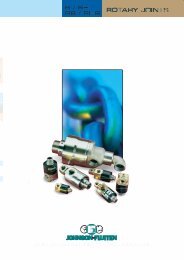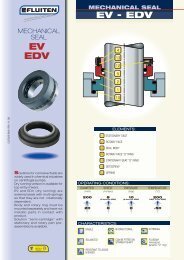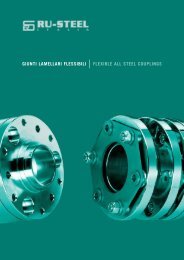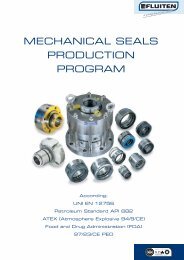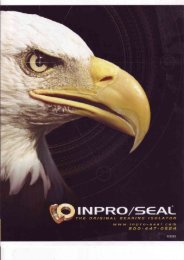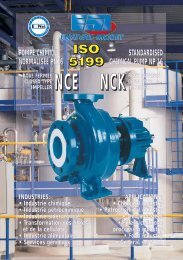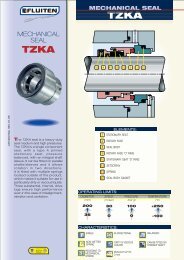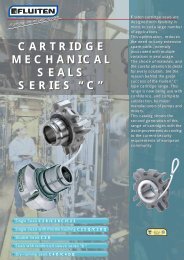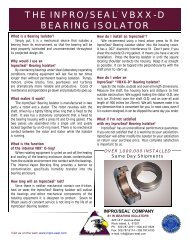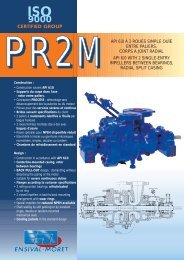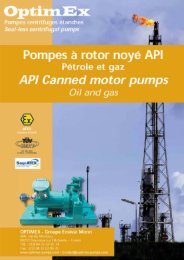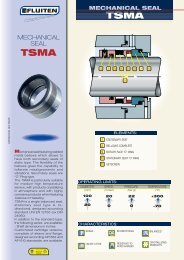Giunti elastici elastic couplings - FLUITEN-VIKOV, s. r. o.
Giunti elastici elastic couplings - FLUITEN-VIKOV, s. r. o.
Giunti elastici elastic couplings - FLUITEN-VIKOV, s. r. o.
You also want an ePaper? Increase the reach of your titles
YUMPU automatically turns print PDFs into web optimized ePapers that Google loves.
Caratteristiche:<br />
Realizzati in: ghisa G.250 e Gomma 80 sh.<br />
Trasmissione <strong>elastic</strong>a atta ad accettare e smorzare<br />
vibrazioni torsionali eventualmente presenti ed<br />
ad annullare gli effetti negativi.<br />
Possibilità di funzionamento in entrambi i sensi di<br />
marcia.<br />
Possibilità di funzionamento in avverse condizioni<br />
ambientali.<br />
Angolo cardanico.<br />
Ampia gamma di esecuzioni che permettono vari<br />
modi di accoppiamento.<br />
Manutenzione ridotta alla sostituzione degli ele<br />
menti <strong><strong>elastic</strong>i</strong>.<br />
Temperatura di esercizio (-30 c° + 120°).<br />
Descrizione<br />
Il giunto <strong>elastic</strong>o RUSTEL è composto da due uguali<br />
corone dentate i cui denti si impegnano rispettivamente<br />
con interposizione di tasselli <strong><strong>elastic</strong>i</strong> ad alta<br />
resistenza che lavorano unicamente a compressione.<br />
Le due corone dentate, perfettamente uguali e simmetriche<br />
nella zona di trascinamento, danno la possibilità<br />
di avere, per brevi periodi, la continuità della<br />
trasmissione senza provocare danni alle macchine<br />
accoppiate, anche in caso di usura completa dei tasselli.<br />
L’impiego del giunto RUSTEL assicura la compensazione<br />
di eventuali piccoli errori di allineamento<br />
tra gli alberi collegati, derivati ad esempio da<br />
inevitabili errori di montaggio, da effetti di<br />
dilatazioni termiche, da <strong><strong>elastic</strong>i</strong>tà delle strutture portanti,<br />
da piccoli assestamenti delle fondazioni, ecc. Il<br />
giunto RUSTEL ammortizza inoltre la trasmissione di<br />
spinte assiali tra i due alberi collegati, proprio grazie<br />
alle sue caratteristiche costruttive.<br />
Characteristics:<br />
<strong>Giunti</strong> <strong><strong>elastic</strong>i</strong><br />
Elastic <strong>couplings</strong><br />
Manufactured in: Cast iron G.250 and Rubber 80 Sh.<br />
Flexible transmission siutable to accept and to damp<br />
torsional vibrations which can occur and to eliminate<br />
the negative effects.<br />
Possibility of functioning in both the running directions.<br />
Possibility of functioning in unfavourable environmental<br />
conditions.<br />
Cardanic angle.<br />
Wide range of manufactures which allow various<br />
coupling ways.<br />
Reduced mantainance after the replacement of the<br />
flexible elements.<br />
Operative temperature (-30 c° +120 c°).<br />
Description:<br />
A B<br />
The RUSTEL <strong>elastic</strong> coupling is composed with two<br />
equal gear rings, whose teeth engage themselves<br />
respectively with interposition of high resistance<br />
resilient blocks, which work only by compression.<br />
The gear rings are perfectly equal and symmetrical in<br />
drive and permit a not flexible coupling in case rubberpads<br />
are unserviceable, not for a long period of<br />
time, without damages for the coupled machines.<br />
The use of RUSTEL coupling assures the rilief of incidental<br />
little misalignments brtween the conected<br />
shafts, which may depend, for istance, on unavoidable<br />
mistakes in the assembly, on thermic expansion,<br />
on <strong><strong>elastic</strong>i</strong>ty of supporting structures, on ground settling,<br />
or on other causes. Furthemore the said coupling<br />
cushions the tramission of axial thrusts<br />
between the two connected shafts, because of its<br />
structural characteristics.<br />
PROGRAMMA DI PRODUZIONE NORMALE • NORMAL STANDARD COUPLINGS<br />
3



